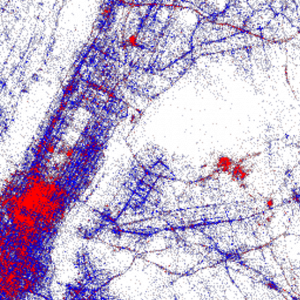
Using big data to study rescue patterns in the Mediterranean
Summary
In the project “Rescue Signatures in the Mediterranean”, UNHCR and the UN Global Pulse analysed big data sources to improve the understanding of search and rescue operation patterns, including how many rescue vessels were involved in different search and rescue (SAR) operations, as well as where and how rescues happened and how long they took. The project used location data from the Automatic Identification System (AIS) of vessel traffic services to determine the routes of ships from Italy and Malta in combination with broadcast warning data of distress calls. AIS transmissions report the location as often as once every two minutes, which provides extremely fine-grained information on vessel behaviour. Before analysing the rescue operations with these vessel data, the team distinguished them from non-rescue operations by identifying their shipping behaviour (speed, bearing, location) automatically using artificial intelligence.
Results
The project found a change in the pattern of distress signals in 2016, with signals being recorded closer and closer to the Libyan shore, forcing rescue operations to venture and expand beyond initial search-and-rescue zones. Furthermore, understanding rescue operations with AIS and broadcast warnings data can also help to profile rescue activity patterns, and create models of rescue operations. For example, speed and course appear to be relatively good predictors of whether a vessel is likely to be conducting a rescue operation. Overall, this project is an innovative approach to analyse and illustrate vessel movements in (non-)rescue operations, and it can easily be replicated globally, especially since AIS data are comparatively easy to access. Furthermore, this approach could potentially expand to provide further systematic analysis, for instance, to identify sea areas with most/lowest vessel traffic, or those (in)sufficiently covered by rescue operations.
(Picture: © UNHCR; Jeremy Boy, Katherine Hoffmann, Felicia Vacarelu, Amanda Zerbe, Miguel Luengo-Oroz)



